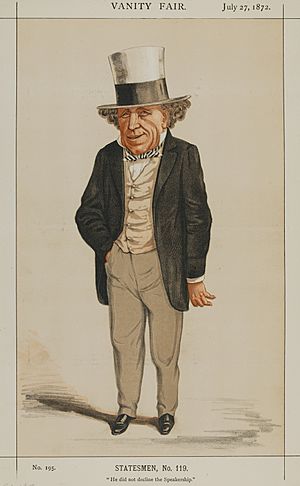Edward Pleydell-Bouverie facts for kids
Quick facts for kids
Edward Pleydell-Bouverie
|
|
|---|---|

"He did not decline the Speakership"
Pleydell-Bouverie as caricatured in Vanity Fair, July 1872 |
|
| Under-Secretary of State for the Home Department |
|
| In office 9 July 1850 – 21 February 1852 |
|
| Monarch | Victoria |
| Prime Minister | Lord John Russell |
| Preceded by | George Cornewall Lewis |
| Succeeded by | Sir William Jolliffe, Bt |
| Paymaster General and Vice-President of the Board of Trade |
|
| In office 31 March 1855 – 13 August 1855 |
|
| Monarch | Victoria |
| Prime Minister | The Viscount Palmerston |
| Preceded by | The Lord Stanley of Alderley |
| Succeeded by | Robert Lowe |
| President of the Poor Law Board | |
| In office 13 August 1855 – 21 February 1858 |
|
| Monarch | Victoria |
| Prime Minister | The Viscount Palmerston |
| Preceded by | Matthew Talbot Baines |
| Succeeded by | Thomas Sotheron-Estcourt |
| Personal details | |
| Born | 26 April 1818 |
| Died | 16 December 1889 (aged 71) 44 Wilton Crescent, London |
| Nationality | British |
| Political party | Liberal |
| Spouses | Elizabeth Balfour (d. 1889) |
| Alma mater | Trinity College, Cambridge |
Edward Pleydell-Bouverie (born 26 April 1818 – died 16 December 1889) was an important British politician from the Liberal Party. He was known as "The Honourable" from 1828. He served in Lord Palmerston's government. He was the Paymaster General and Vice-President of the Board of Trade in 1855. From 1855 to 1858, he was the President of the Poor Law Board. This role involved managing laws about poverty and helping people in need.
Contents
Early Life and Education
Edward Pleydell-Bouverie was born on April 26, 1818. He was the second son of William Pleydell-Bouverie, 3rd Earl of Radnor. His family lived in grand homes like Longford Castle and Coleshill House. His older brother was Jacob Pleydell-Bouverie, 4th Earl of Radnor.
Edward went to Harrow School, a famous boarding school. After that, he studied at Trinity College, Cambridge, where he earned a Master of Arts degree in 1838. He also joined the Royal Berkshire Militia, which was a part-time military group, becoming a captain in 1838.
Before becoming a lawyer, he worked for Lord Palmerston from January to June 1840. He helped Palmerston with writing important documents. In 1843, he officially became a lawyer, or was "called to the Bar" at Inner Temple.
Political Career
In 1844, Edward Pleydell-Bouverie was elected to Parliament for the area of Kilmarnock Burghs. He represented this area until 1874.
He held several important government jobs:
- From 1850 to 1852, he was the Under-Secretary of State for the Home Department. This meant he helped manage internal affairs for the country under Lord John Russell.
- From 1853 to 1855, he was the Chairman of Committees in the House of Commons. This role meant he led many of the discussions and debates in Parliament.
- In 1855, when Lord Palmerston became Prime Minister, Edward was made Paymaster General and Vice-President of the Board of Trade. He also joined the Privy Council, a group of important advisors to the Queen.
- Later in 1855, he became the President of the Poor Law Board. He held this position until 1858. This job was about creating and managing laws to help people who were poor or in need.
Even though he held many important roles, he was never part of the main group of government ministers called the Cabinet. He also worked as a Second Church Estate Commissioner and an Ecclesiastical Commissioners for England, dealing with church property and finances.
Disagreements with Gladstone
Edward Pleydell-Bouverie was a strong Liberal, but he belonged to an older way of thinking called the "Whig school." In his later years in Parliament, he often disagreed with the policies of the Liberal Prime Minister, William Ewart Gladstone.
For example, in 1872, he criticized Gladstone for making an appointment that seemed to bend the rules. He famously said that Gladstone's "amusement" was to find ways around laws.
His biggest disagreement with Gladstone came in March 1873 over the Irish University Bill. This bill was about education in Ireland. Edward strongly opposed it, calling it "bad" and "inadequate." He voted against the bill, which led to the government being defeated. He continued to write letters to The Times newspaper, criticizing the bill and those who created it.
After Parliament
After leaving Parliament in 1874, Edward Pleydell-Bouverie became involved with the Corporation of Foreign Bondholders in 1877. He soon became its chairman. In this role, he helped many countries sort out their financial debts.
He also served as Deputy Chairman of the Mersey Railway when it opened in 1886. He was a director for other big companies too, like the Great Western Railway Company and the Peninsular and Oriental Steam Navigation Company. He often wrote letters to The Times newspaper, signing them "E. P. B."
In 1882, he was appointed High Sheriff of Wiltshire, a ceremonial role for the county.
Family Life
Edward Pleydell-Bouverie married Elizabeth Anne Balfour on November 1, 1842. Elizabeth was the youngest daughter of General Robert Balfour. They lived at Market Lavington Manor in Wiltshire.
They had two sons, Walter (born 1848 – died 1893) and Edward Oliver (born 1856 – died 1938). Walter was a captain in the local volunteer army. They also had three daughters. One of their daughters, Eglantine, married Augustus Keppel Stephenson, who was a important lawyer for the government.
Elizabeth Anne died in August 1889. Edward Pleydell-Bouverie passed away just four months later, on December 16, 1889, at the age of 71, in London.
 | Percy Lavon Julian |
 | Katherine Johnson |
 | George Washington Carver |
 | Annie Easley |

